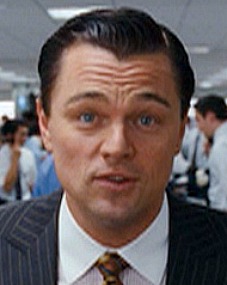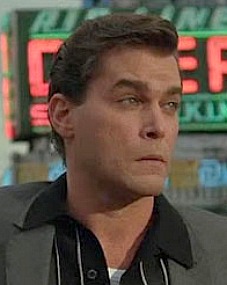I was a little bit suspicious of the euphoric SAG reactions to last weekend’s Wolf of Wall Street screenings. The emotional nature of actors makes them easy lays, for one thing, and like most people they tend to deeply appreciate being shown a hot film before anyone else. So to get an idea of how Martin Scorsese‘s film really plays I spoke today to a discriminating New York critic who caught the three-hour-long film at 3 pm Eastern. And guess what? He was seriously impressed (“Really strong…an amazing piece of moviemaking“) and felt the high-octane quality of the performances by Leonardo DiCaprio and Jonah Hill, among others, but he had moral-ethical problems with watching a film about “such a scumbag” as Jordan Belfort, the real-life former Wall Street trader whom DiCaprio reportedly brings to flamboyant life.


(l.) Leonardo DiCaprio as Jordan Belfort in The Wolf of Wall Street; (r.) Ray Liotta as Henry Hill in Goodfellas.
“This guy is worse than Henry Hill,” the critic said, referring to the gangster played by Ray Liotta in Scorsese’s Goodfellas, which the critic says is similar but “more primal” than Wolf of Wall Street. Belfort is “not killing people, but he’s a thief helping to kill people’s dreams.” Is he as bad as Tony Montana?, I asked. He thought about it for eight or ten seconds and said, “He’s in the same ballpark.”
“I not only didn’t care about this guy,” he said. “I was asking myself, why am I watching this guy’s story? And why should I tell people to go see [this film]?.” He described Belfort/DiCaprio as an obnoxious, drug-cranked, completely un-self-aware guy “with no soul, no vision, no wisdom…I was just repelled by him.”
He acknowledges that legendary bad guys have always been swaggering, larger-than-life figures and that Wolf of Wall Street is, of course, a societal indictment that shows the audience who and what Wall Street finaglers really are deep down and the true color of their souls, but it still conveys “the wrong message. Scorsese absolutely shows us what a scumbag this guy is [but] still I was asking myself, why am I watching this? It [felt like] excess for own sake, being celebrated for its own sake. It’s Scorsese at the top of its form, but why this story?”
He basically seemed to be saying that Wolf is a little too circus-like and engrossing in a highly-charged and orgiastic sense, given the subject matter and the vile characters. He suspects that a fair portion of the audience is going to be more entertained than anything else, and that the sober, solemnly meditative aspects may be ignored altogether, particularly by the under-30 crowd.
Isn’t this the same kind of thing that the bluenoses were saying about the criminal characters in the early to mid ’30s gangster films?
